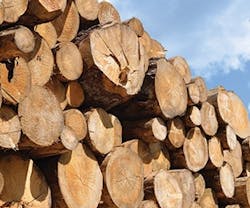Wood for Biofuel May Have Adverse Environmental Effects
Woody biomass accounts for roughly 75% of global biofuel production, but it could affect carbon emissions more than previously believed.
Deep mineral soil, which stores more than 50% of the carbon in forest soils, may contribute greater increases in atmospheric carbon dioxide than researchers originally thought, according to a new study led by Dartmouth College.
“Our paper suggests that increased reliance on wood may have the unintended effect of increasing the transfer of carbon from the mineral soil to the atmosphere,” explains Andrew Friedland, a Dartmouth professor and co-author of the study. “So the intended goal of reducing carbon in the atmosphere may not be met.”
Atmospheric studies don’t typically take into account carbon stored in deep soil because it was believed to be unaffected by timber harvesting. Carbon responses vary depending on harvesting intensity, surface disturbance, and soil type, but the new findings indicate that such analysis should include a consideration of forest carbon cycles, researchers say.
For more information, see the study’s full results in Global Change Biology-Bioenergy.
